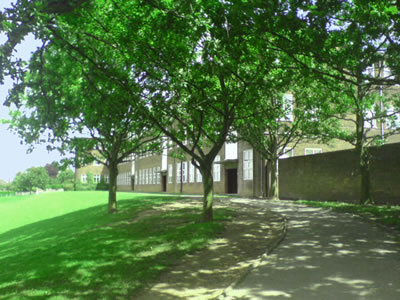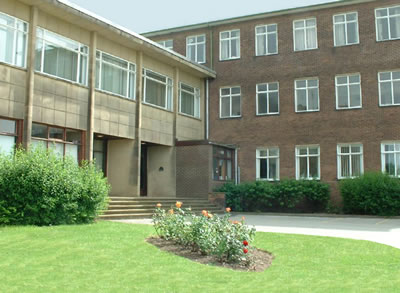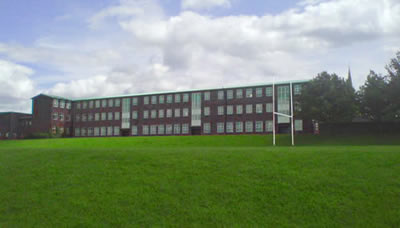Robert James: 1975, Staff eye view
 Robert James was a member of staff at the time of transition from Burton Grammar School to Abbot Beyne Comprehensive:
Robert James was a member of staff at the time of transition from Burton Grammar School to Abbot Beyne Comprehensive:
The dreaded ‘C’ word (comprehensive) wasn’t heard a great deal in 1970-71. Teachers knew that there were plans for re-organisation, but Ted Heath’s victory in the June 1970 general election, contrary to the predictions of every opinion poll, meant that they were unlikely to go ahead. Burton, it is often forgotten, was then a County Borough, not administratively part of Staffordshire. But local government re-organisation meant that this independence was soon to be lost, and coupled with a change in the political climate locally and nationally, it became clear that comprehensive re-organisation was inevitable.
The Headmaster, Bill Gillion, announced his retirement in 1973, no doubt seeing the writing on the wall, and after a term when Geoff Henton was acting head, Brian Harris took over the reins in January 1974. He was a man of high principles, as his decision to go into the church five years late clearly showed. He was approachable whilst at the same time having considerable presence. It is often forgotten that he had taught at one of the leading grammar schools in the North of England, Stockport G.S., and managed BGS as a grammar school very effectively.
By this time, numbers in the school were falling. Pupils who had previously come from outlying villages in both Derbyshire and Staffordshire now were directed to their nearest secondary school. In 1974, the intake was only 2 forms instead of the usual 3. Another nail was being driven into the coffin.
Before Mr Harris’ arrival, the governors had sought Direct Grant status from the Minister of Education. There were many Direct Grant Schools in the country, prestigious grammar schools such as Loughborough GS, Nottingham High School, King Henry’s Coventry. These schools were not funded by the local authority but by a grant from central government, hence the name. This gave them much more independence than the voluntary controlled schools such as BGS.
 The Secretary of State for Education at the time however, refused to re-open the direct grant list. Given that person’s later education policies, this may seem surprising – it was none other than Margaret Thatcher. Fifteen years or so later, her government’s Education Reform Act set up Grant Maintained Schools to free schools, if they so wished, from the dead hand of local authority control. By that time, the old Direct Grant Schools had been forced by the previous administration to choose either to go totally independent or be subsumed into the local authority system.
The Secretary of State for Education at the time however, refused to re-open the direct grant list. Given that person’s later education policies, this may seem surprising – it was none other than Margaret Thatcher. Fifteen years or so later, her government’s Education Reform Act set up Grant Maintained Schools to free schools, if they so wished, from the dead hand of local authority control. By that time, the old Direct Grant Schools had been forced by the previous administration to choose either to go totally independent or be subsumed into the local authority system.
The irony of the setting up of Grant Maintained Schools by the Thatcher government was not lost on those of us still at Abbot Beyne and charged with implementing the 1988 Act. However, there was considerable opposition and pressure from the local authority and the governors not to seek Grant Maintained Status, and the school’s management got on with the job of implementing the other major initiatives started by the Act – local financial management and the National Curriculum.
It was the elections of 1974 which made re-organisation inevitable. Few amongst the staff would have argued that the selection process at age 11 was ideal, but there were many who considered that just as flawed was a total, rushed and inadequately funded upheaval of the secondary education of the town based on two split-site schools at the former grammar schools and single site schools at the two remaining secondary moderns.
However, inevitably the plans went ahead and there was to be new school based on the old Girls’ High School, BGS and the Ada Chadwick School.
It was a stressful time for the staff of all three schools. In the summer of 1975, staff had to apply for the new posts in the new school. Some kept their status, some were promoted, some moved into new posts and others lost their status, even if salaries were safeguarded.
 Everything happened at break-neck speed. The new school had to be up and running within months. There was no investment in facilities apart from botched-up conversions of toilets. One group of parents attempted to halt the re-organisation by seeking an injunction. It was the middle of August when a judge in chambers ruled that to unpick the re-organisation at that stage would have been more harmful than to let it go ahead. Until then, we didn’t know for certain what awaited us at the start of the autumn term.
Everything happened at break-neck speed. The new school had to be up and running within months. There was no investment in facilities apart from botched-up conversions of toilets. One group of parents attempted to halt the re-organisation by seeking an injunction. It was the middle of August when a judge in chambers ruled that to unpick the re-organisation at that stage would have been more harmful than to let it go ahead. Until then, we didn’t know for certain what awaited us at the start of the autumn term.
Much bitterness had been generated, with the opinions of many becoming totally polarised. They were difficult times, and there is little point now in opening old wounds and resurrecting the acrimony of 1975.
Brian Harris, as Head of the new Abbot Beyne School, was inevitably regarded by some of the defenders of the old regime with suspicion, but he showed enormous reserves of resilience as well as sincerity, and did his utmost to bring the staff together and make the new school work. He did an excellent job in the most trying of conditions, as did the senior staff of all the schools.
Staff opinions at BGS varied. All were naturally apprehensive. What many found galling was the fact that some of the more vociferous proponents of the Comprehensive System had left shortly before, leaving the rest of us to pick up the pieces. Many staff were not opposed to the principle of a comprehensive system, but had well-founded fears about its imposition on three schools without the appropriate investment in new building and resources. This was, after all, the era in which Denis Healey, as Chancellor of the Exchequer, had to go cap in hand to the International Monetary Fund, such was the state of the nation’s finances.
Split-site schools are difficult to manage. Travelling between sites leads to stress and fatigue, as well as making timetabling and supervision inordinately difficult. Gone were the old days when you walked a few yards from the staffroom to your class. Now, for many, it was a dash to the car-park, often carrying a pile of books or resources, and a journey along Bearwood Hill Road to be in time for the next lesson.
 The vast majority of staff, especially the younger ones, were pragmatic. If they wished to teach in a grammar school, then they had to look towards the independent sector. This was not appealing to many of those who had been educated and had taught in the state system. Staff had to do their utmost, for the sake of all pupils, to make the slit-site system, imperfect though it was, work.
The vast majority of staff, especially the younger ones, were pragmatic. If they wished to teach in a grammar school, then they had to look towards the independent sector. This was not appealing to many of those who had been educated and had taught in the state system. Staff had to do their utmost, for the sake of all pupils, to make the slit-site system, imperfect though it was, work.
New ways of working had to be adapted whilst at the same time trying to maintain the best features and traditions of the school. The object was always to provide the best education possible. Whether this can be judged to be successful or not, it was certainly not for lack of trying by those involved at the time.
Deus Nobiscum

